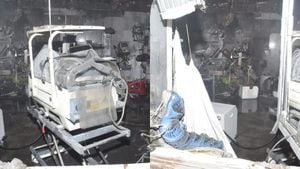Russia has ramped up its attacks on Ukraine’s energy infrastructure as winter approaches, intensifying the humanitarian crisis facing the war-torn country. These brutal assaults have left millions of Ukrainians facing the chilling possibility of losing heat and electricity during the coldest months of the year.
The most recent wave of strikes was noted on November 15, when numerous cities, including the capital Kyiv, felt the full brunt of Russia's bombardment. Air raid sirens sounded across Ukraine as missiles targeted key energy facilities, aiming to cripple the nation’s ability to provide heat and light during the frigid winter. Ukraine's Prime Minister Denys Shmyhal reported at least 10 regions suffering from power outages as the country struggled to restore its electricity system following these strikes.
Since the onset of the war, Russian forces have increasingly focused their campaigns on Ukraine’s energy infrastructure. The threats significantly escalated after Ukrainian forces regained territory during counter-offensive operations earlier this year. Kyiv's officials contend this latest push to destroy energy facilities is part of Russia's strategy to exert pressure on the Ukrainian government and civilian population, hoping to compel negotiations on more favorable terms.
These actions have not only taken aim at Ukraine's electrical grid but also at heat generating plants and supply lines necessary for distributing energy to homes and businesses. Merely days before the latest strikes, Ukraine's energy operator reported the network's “wear and tear” due to sustained military engagements, raising alarms about the capacity to supply both electricity and heating fuels as winter quickly approaches.
Despite the desperate conditions, the Ukrainian government remains resolute, stating their commitment to ensuring heat and energy supplies remain as stable as possible. President Volodymyr Zelenskyy vowed to take every measure to protect civilians as winter becomes increasingly brutal. He underscored the resolve of Ukrainians to resist aggression, urging citizens to brace for the cold by stocking necessary supplies like blankets, food, and warm clothing.
Adding to the plight of ordinary Ukrainians are the repercussions of Russian missile strikes disrupting centralized heating systems, affecting both residential and commercial buildings across the nation. Authorities have urged residents to find alternative accommodations if they experience outages, with makeshift arrangements set up, such as heating stations, to provide warmth and sustenance.
International responses to this heightened aggression have emphasized the commitment of Western nations to support Ukraine, not only military but also humanitarian assistance. Aid partners are scrambling to deliver generators and heat sources to vulnerable regions, hoping to mitigate the worst impacts of Russia's campaign against Ukraine’s infrastructure.
The global community, aware of the dire humanitarian situation at hand, has also reacted strongly against Russia’s actions. Leaders have convened discussions aimed at coordinating support for Ukraine to withstand the heightening threats. This coalition aims at bolstering Ukraine’s energy resilience by providing equipment and materials needed to restore and upgrade energy infrastructure.
Citizens of Kyiv have begun to organize their own efforts to prepare for potential energy shortages. DIY solutions and communal initiatives have emerged as people are engaging with each other, forming groups to brainstorm alternative heating solutions, including the use of wood stoves and other non-electric heating methods, which hark back to older, more traditional ways of life.
The situation puts significant stress not only on Ukraine’s energy resources but also on its economy. Many businesses face closures due to power disruptions which prevent operations. Consequently, employment rates have declined and inflation has soared as prices of goods and services have risen amid worsening shortages. Economic experts warn of the looming recession if the situation persists, urging immediate action and aid to help stabilize the economy.
Ongoing international negotiations for military support, alongside humanitarian aid, are currently taking place. Ukraine continues to appeal not only for weapons but also for advanced systems capable of protecting its skies from missile threats to safeguard energy facilities against future attacks. Countries such as the United States and members of NATO reiterate their pledges to assist Ukraine, yet the timeline for delivery on some resources remains unpredictable due to logistical challenges.
On the social front, primary healthcare facilities are also feeling the effects of this renewed aggression. Patients with chronic illnesses are finding it increasingly difficult to access medical care as power shortages disrupt operations at many hospitals. Authorities are seeking swift measures to equip hospitals with generators and alternative power solutions to keep medical equipment running.
Higher education institutions are also grappling with the ramifications of energy deficiencies, as many universities and schools have been forced to cancel classes or transition to remote learning. The lack of consistent power supply severely hampers academic performance and puts students' futures at risk amid the war crisis. Leaders within the education sector are lobbying for priority on aid distributions, insisting on the necessity of power restoration to safeguard learning environments.
Both citizens and authorities recognize resilience is key, yet the fear of rising violence coupled with harsh winters may spike anxieties among the population. Many can only speculate what the immediate and long-term future holds under these grave circumstances as winter's arrival compounds the difficulties once again.
Experts continue to assess the strategic ramifications of Russia’s intensive assaults on energy infrastructure. Some analysts believe these actions are inherently self-defeasing; crippling civilian infrastructure does little to quell military resistance but instead fuels international outrage and determination to support Ukraine. The persistent attacks are causing unease among Russian allies as they worry the ramifications of prolonging the conflict could backfire, impacting geopolitical stability for years.
Until negotiations yield tangible results, the world watches closely as this cold war not only pits military resilience against offensive strikes but also tests the spirit of the Ukrainian people against stressors inflicted by heavy-handed tactics on energy systems. Each missile launched, each outage reported, signifies not only the immediate impact but reverberates consequences through the fabric of Ukrainian society.
This complicated affair hints at greater narratives where humanity, survival, and the spirit of defiance contend against the backdrop of geopolitical maneuvering, raising poignant questions about the lengths one must go to preserve autonomy and maintain the essence of community even when the cold winds threaten to extinguish hope.



